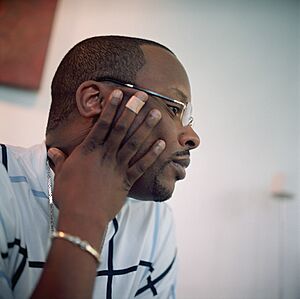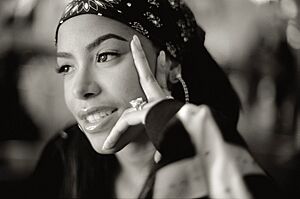Jive Records facts for kids
Quick facts for kids Jive Records |
|
|---|---|
 |
|
| Parent company | Sony Music Entertainment |
| Founded | 1981 |
| Founder | Clive Calder |
| Defunct | October 7, 2011 |
| Status |
|
| Distributor(s) | Legacy Recordings (reissues) |
| Genre | Various |
| Country of origin | United States |
| Location | New York, Chicago |
Jive Records was a British-American independent record label. It was started by Clive Calder in 1981 as part of the Zomba Group. In the US, Jive had offices in New York City and Chicago. The label became famous for its success with hip hop, R&B, and dance artists in the 1980s and 1990s. Later, it was known for teen pop and boy bands in the late 1990s and early 2000s.
Bertelsmann Music Group (BMG) bought Jive in 2002. In 2008, Sony Music Entertainment bought BMG. Jive Records then became fully owned by Sony. The label stopped operating in 2011 and was joined with RCA Records.
Contents
How Jive Records Started
Early Days: Zomba Group (1970s)
In 1971, two businessmen from South Africa, Clive Calder and Ralph Simon, started a company. It was called Zomba Records. Four years later, they moved their company to London, England. Their first client was a young producer named Robert "Mutt" Lange. Zomba first wanted to focus on helping songwriters and producers. They let other record labels release the music. Later, the company opened offices in the US. There, Calder began working with Clive Davis, whose Arista Records released music by Zomba artists.
Forming Jive Records (1981)
In 1981, Zomba created Jive Records. Jive started by releasing British dance and pop music. Some early groups included Q-Feel, A Flock of Seagulls, and Tight Fit. The name "Jive" came from township Jive, a type of music from South Africa. Clive Davis hoped that Zomba's connection with Mutt Lange would help Arista Records with rock music.
Jive Records Grows
Becoming Popular with Hip Hop (1982–1995)

By 1982, Calder met Barry Weiss. Weiss showed Calder hip-hop clubs in New York City. Weiss and Calder then helped create the hip hop group Whodini. The group quickly made a hit song called "Magic's Wand." Even though Whodini later left Jive, their early success helped the label focus on hip-hop artists throughout the 1980s.
In 1987, Jive stopped working with Arista Records. This separated them from Clive Davis, who did not like hip hop music. As the 1980s ended, Jive started a new deal with RCA Records. Jive continued to sign hip hop artists. These included DJ Jazzy Jeff & The Fresh Prince, Boogie Down Productions, Too $hort, Schoolly D, and Kid Rock.
In 1990, Calder bought Simon’s share of Zomba. This made him the only owner of Jive Records. Jive's deal with RCA ended in 1991. At this time, Bertelsmann Music Group (BMG) bought a small part of Jive. BMG then started to distribute Jive's records directly. Barry Weiss became the head of Jive Records that year. Jive opened offices in Chicago. It also became a top label for hip hop and R&B music. Successful artists included D-Nice, E-40, UGK, A Tribe Called Quest, Hi-Five, KRS-One/Boogie Down Productions, R. Kelly, and Aaliyah.
Rise of Teen Pop (1996–2001)
In 1996, BMG bought a larger part of Jive, owning 20 percent. By the late 1990s, Jive began signing pop artists. These included Backstreet Boys, NSYNC, and Britney Spears. All three groups became very successful in the early 2000s. They became the three best-selling artists in Jive's history.
Jive Records Joins Bigger Companies
Acquisition by BMG and Sony (2000s)
In 2002, Calder sold Zomba to BMG for about $2.74 billion. This was the largest purchase of an independent record label at that time. Calder then announced he would leave Zomba. However, he stayed at Jive for a short time to help as Zomba joined BMG. Weiss took over from Calder as the new head of Zomba.
In 2004, BMG joined with Sony Music Entertainment to form Sony BMG. During this time, Jive's management and distribution changed. They became part of the new Zomba Label Group. Artists who were on other labels like LaFace and Arista Records then joined the Zomba group. Their music was handled by Jive Records staff. So, artists like Pink, Usher, and Outkast became Jive artists.
Even though sales of physical records and teen pop music went down in the early 2000s, Jive's new artists did well. Usher’s album Confessions and Outkast’s Speakerboxxx/The Love Below made a lot of money for Jive. Jive also released Britney Spears’ 2007 album Blackout. Justin Timberlake also had high sales with his solo album FutureSex/LoveSounds. Other Jive artists at that time included Ciara and Chris Brown.
By early 2008, the BMG Label Group included RCA Records, J Records, LaFace, Arista, Volcano Entertainment, Verity, GospoCentric, and Fo Yo Soul. Barry Weiss oversaw all of them. Later in 2008, Sony and BMG ended their partnership. Sony bought BMG's shares. Because of this, Jive (along with RCA and Arista) became fully owned by Sony Music Entertainment. Starting in 2008, Jive's name was written in all capital letters (JIVE Records). This change happened when BMG Label Group was renamed RCA/JIVE Label Group.
Jive Records Stops Operating (2010s)
After being president of Jive for twenty years, Barry Weiss left for Universal Music Group in March 2011. On October 7, 2011, it was announced that Jive, along with Arista and J Records, would be closed down. This was done to make RCA Records stronger and clearer. All artists from those labels then moved to RCA Records.
The Jive label is currently not active. Legacy Recordings, part of Sony Music, handles the distribution of its older music. Before 2019, the Jive brand was used only by Sony Music France as Jive Epic in France. It was then joined with RCA Records France.
More About Jive Records
- Zomba Group of Companies
- RCA/Jive Label Group
- List of record labels
See also
 In Spanish: Jive Records para niños
In Spanish: Jive Records para niños
 | Madam C. J. Walker |
 | Janet Emerson Bashen |
 | Annie Turnbo Malone |
 | Maggie L. Walker |


